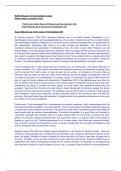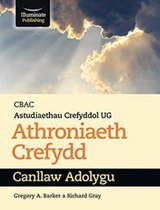WJEC Eduqas A level exemplar essays
(Both essays included in full)
- "Finnis has a better theory of Natural Law than Aquinas" (30)
- Apply Natural Law to the issue of immigration (20)
Apply Natural Law to the issue of immigration (20)
St Thomas Aquinas (1225-1274) developed Natural Law in his Book Summa Theologica. It is a
deontological (duty based) and teleological(rightness of an action is determined by the end goal) hybrid.
The deontological aspects of Natural Law are shown by the 5 primary precepts which are preservation of
life, reproduction, worshiping God, living in an orderly society and education. John Finnis was an
Australian professor who specialised in philosophy of law. He wrote a book called "Natural Law and
Natural Rights' ' and redeveloped Aquinas's natural law where he argues that the purpose of Natural Law
is to ensure that a person is able to live a fulfilling life by using the 7 basic goods. Aquinas believed nature
was made for people to find happiness and get closer to God. Finnis accepts there is a natural justice that
is universal, however unlike Aquinas, Finnis argued that Natural Law’s purpose is to enable a person to
‘flourish’. The term immigration means the action of coming to live permanently in a foreign country.
Finnis developed the 7 basic goods that are universal and are self-evident, and rejects Aquinas’s 5
primary precepts. The 7 basic goods are evident from practical reasoning not theoretical reasoning, they
can't be derived from God’s Laws, or logic as logic can be wrong , or inclinations of human brain as
decisions can’t be made, as they don’t exist. Finnis Natural Law can be applied to immigration, which is
the action of coming to live permanently in a foreign country. For example, the case of Alan Kurdi who
was a 3 year old Syrian refugee who drowned on 2 September 2015 in the Mediterranean sea when he
and his family were trying to reach Europe. Finnis would support immigration because those who were
immigrating are trying to achieve the basic goods, by living better lives elsewhere where they are
accepted. Alan Kurdi lost his life as he was trying to reach Europe with his family to escape the Syrian
war and could not meet all basic goods. If an individual must do what it takes to meet the 7 basic goods,
then immigrants must not be neglected, as they bring their skills for the country to work and help the
economy, they want better lives and education, immigrants also bring aesthetic experiences as there will
be a wider mix of cultural aesthetics.
Furthermore, Finnis developed the 9 requirements of practical reasoning, which demonstrates that the
basic goods should be applied to everyone equally. Finnis would support controlled immigration because
a requirement is that everyone should aim to do good and avoid evil by completing actions which fulfill the
basic goods such as practical reasonableness. Controlled immigration is a good thing as it benefits a
community outweighs the problems such as it helps people within the community to achieve the basic
goods. For example, helping immigrants who may have been living in corrupted unsafe environments is
viewed as ‘good’ not ‘evil’. Another requirement is not to harm others, Alan Kurdi was harmed and killed,
due to trying to escape the living terrors of war, so people should think and use their knowledge for next
time an immigrant wants to enter their country.
Aquinas argues that God has instilled natural inclinations in all humans to behave morally using our
synderesis (pursuing good and avoiding evil) and phronesis (use practical reasoning) to lead us to real
good. He stated, "the light of reason is placed by nature [and thus by God] in every man to guide him in
his acts." Therefore, as we are God conscious, we use reasoning when living. Aquinas’s Natural Law is
applicable to the issue of immigration through the five primary precepts. For example, an immigrant may
have fled their country for various reasons such as war , to escape violent conflict or to find employment.





